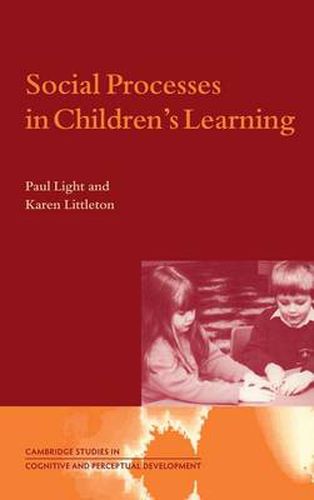Readings Newsletter
Become a Readings Member to make your shopping experience even easier.
Sign in or sign up for free!
You’re not far away from qualifying for FREE standard shipping within Australia
You’ve qualified for FREE standard shipping within Australia
The cart is loading…






This book is about children’s learning and problem-solving behaviour. It reflects the increasingly close integration seen in recent years between social and cognitive approaches to researching the learning process. In particular, Paul Light and Karen Littleton examine the ways in which interactions between children influence learning outcomes. They begin by placing this topic in a broad theoretical and empirical context and go on to present a substantial series of their own experimental studies, which focus on children of late primary and early secondary school age. These investigations address peer facilitation of problem solving, social comparison effects on learning and social context effects upon the interpretation of tasks. Many of the studies involve computer-based learning but the findings have implications both for classroom practice and the understanding of the learning process. This book will be a valuable tool for researchers, teachers and practitioners interested in the social processes of children’s learning.
$9.00 standard shipping within Australia
FREE standard shipping within Australia for orders over $100.00
Express & International shipping calculated at checkout
Stock availability can be subject to change without notice. We recommend calling the shop or contacting our online team to check availability of low stock items. Please see our Shopping Online page for more details.
This book is about children’s learning and problem-solving behaviour. It reflects the increasingly close integration seen in recent years between social and cognitive approaches to researching the learning process. In particular, Paul Light and Karen Littleton examine the ways in which interactions between children influence learning outcomes. They begin by placing this topic in a broad theoretical and empirical context and go on to present a substantial series of their own experimental studies, which focus on children of late primary and early secondary school age. These investigations address peer facilitation of problem solving, social comparison effects on learning and social context effects upon the interpretation of tasks. Many of the studies involve computer-based learning but the findings have implications both for classroom practice and the understanding of the learning process. This book will be a valuable tool for researchers, teachers and practitioners interested in the social processes of children’s learning.